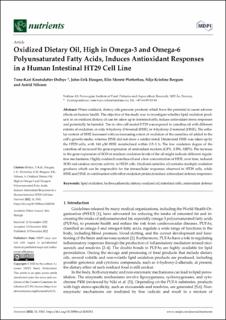| dc.contributor.author | Østbye, Tone-Kari K | |
| dc.contributor.author | Haugen, John-Erik | |
| dc.contributor.author | Wetterhus, Elin Merete | |
| dc.contributor.author | Bergum, Silje | |
| dc.contributor.author | Nilsson, Astrid | |
| dc.date.accessioned | 2022-12-20T09:56:45Z | |
| dc.date.available | 2022-12-20T09:56:45Z | |
| dc.date.created | 2022-12-16T09:35:54Z | |
| dc.date.issued | 2022 | |
| dc.identifier.issn | 2072-6643 | |
| dc.identifier.uri | https://hdl.handle.net/11250/3038772 | |
| dc.description.abstract | When oxidized, dietary oils generate products which have the potential to cause adverse effects on human health. The objective of the study was to investigate whether lipid oxidation products in an oxidized dietary oil can be taken up in intestinal cells, induce antioxidant stress responses and potentially be harmful. The in vitro cell model HT29 was exposed to camelina oil with different extents of oxidation, or only 4-hydroxy-2-hexenal (HHE) or 4-hydroxy-2-nonenal (HNE). The cellular content of HHE increased with an increasing extent of oxidation of the camelina oil added to the cell’s growth media, whereas HNE did not show a similar trend. Deuterated HHE was taken up by the HT29 cells, with 140 μM HHE metabolized within 0.5–1 h. The low oxidation degree of the camelina oil increased the gene expression of antioxidant markers (GPX, ATF6, XBP1). The increase in the gene expression of SOD at medium oxidation levels of the oil might indicate different regulation mechanisms. Highly oxidized camelina oil and a low concentration of HHE, over time, induced SOD and catalase enzyme activity in HT29 cells. Oxidized camelina oil contains multiple oxidation products which can be responsible for the intracellular responses observed in HT29 cells, while HHE and HNE in combination with other oxidation products induce antioxidant defence responses. | |
| dc.language.iso | eng | |
| dc.title | Oxidized Dietary Oil, High in Omega-3 and Omega-6 Polyunsaturated Fatty Acids, Induces Antioxidant Responses in a Human Intestinal HT29 Cell Line | |
| dc.title.alternative | Oxidized Dietary Oil, High in Omega-3 and Omega-6 Polyunsaturated Fatty Acids, Induces Antioxidant Responses in a Human Intestinal HT29 Cell Line | |
| dc.type | Peer reviewed | |
| dc.type | Journal article | |
| dc.description.version | publishedVersion | |
| dc.source.volume | 14 | |
| dc.source.journal | Nutrients | |
| dc.identifier.doi | 10.3390/nu14245341 | |
| dc.identifier.cristin | 2094147 | |
| dc.relation.project | Nofima AS: 202101 | |
| dc.relation.project | Norges forskningsråd: 314599 | |
| dc.relation.project | Nofima AS: 201701 | |
| dc.relation.project | Norges forskningsråd: 262300 | |
| cristin.ispublished | true | |
| cristin.fulltext | original | |
| cristin.qualitycode | 1 | |
